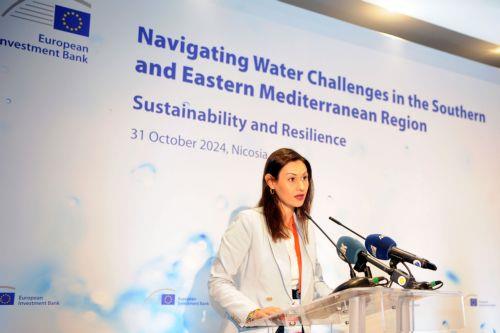The need for cooperation by the countries and organisations of the Mediterranean states in the pressing field of water challenges was highlighted during a regional conference on water resilience organised by the European Investment Bank (EIB) in Nicosia on Thursday.
The one-day conference titled “Navigating water challenges in the Southern and Eastern Mediterranean region,” gathered experts, policymakers and stakeholders to foster collaborative solutions for water sustainability and resilience in the Southern and Eastern Mediterranean region.
“Today’s event, aptly titled “Navigating Water Challenges in the Southern and Eastern Mediterranean Region”, is a call to action—a call to address these challenges with urgency, innovation, and cooperation,” Cypriot Minister of Agriculture, Rural Development and Environment, Maria Panayiotou said addressing the event.
“Water scarcity,” she stressed, “is not just an environmental challenge; it is a multidimensional issue with far-reaching economic and social ramifications. It threatens food security, hampers economic growth, and disrupts social stability.”
As she added, for our region, where we face both shared and distinct water-related challenges, cooperation is one of our strongest assets. Cyprus stands ready to work closely with its neighbours, both bilaterally and regionally, to develop resilient water systems that can withstand the pressures of climate and demographic expansion.
Panayiotou furthermore stressed the Mediterranean region, known for its distinctive climate and rich biodiversity, is increasingly vulnerable to the impacts of climate change and water scarcity.
Rising temperatures, shifting rainfall patterns and more frequent and severe droughts are realities that we must contend with. These changes lead to a reduction in annual rainfall and intensify competition for water resources, she said, adding that Cyprus is a prime example of a Mediterranean country grappling with these challenges.
Miriam Dalli, Minister for the Environment, Energy and the Regeneration of the Grand Harbour Malta, said the declining rainfall adds pressure to groundwater waters, with the authorities trying to distribute water resources in the agricultural sector, a process that cannot happen overnight.
With regard to municipal water, the Maltese Minister said there is a plan which combines water from desalination and groundwater, which is dwindling.
We need a change on the previous plan for the usage of 60% of water from desalination and 40% by groundwater, she noted, “because we want to stop pressuring our natural resources and to provide time for their replenishment.”
But she highlighted the problem of financing, noting that the aim is to achieve the optimum financing, whereas many projects of the Water Services Cooperation are financed by European funds.
On his part, Kyriacos Kakouris, Vice President of the EIB, said in his address that water resilience is not just an environmental issue but an issue that has financial, security and equality dimensions.
“The way by which we will manage our water resources today will define the future of the South and Eastern Mediterranean countries for the generations to come,” he stressed, adding that the Mediterranean is uniquely exposed to the impact of climate change.
And without immediate and coordinated action the situation will deteriorate, he pointed out.
Kakouris said the EIB is committed to supporting the efforts to tackle these challenges, as the bank is one of world’s largest multilateral investors in water management.
The EIB, Kakouris said, aims not only to continue but to further extend its activities concerning drought, resilience in floods and to innovate in its collaboration with its partners via a new programme on water, which is one of the bank’s strategic priorities to support the countries that are in the front line of the consequences of climate change.
However, the EIB Vice President said the EIB or any other individual organisation cannot achieve water resilience in the Mediterranean on its own.
(Story by Gregoris Savva, Cyprus News Agency)



